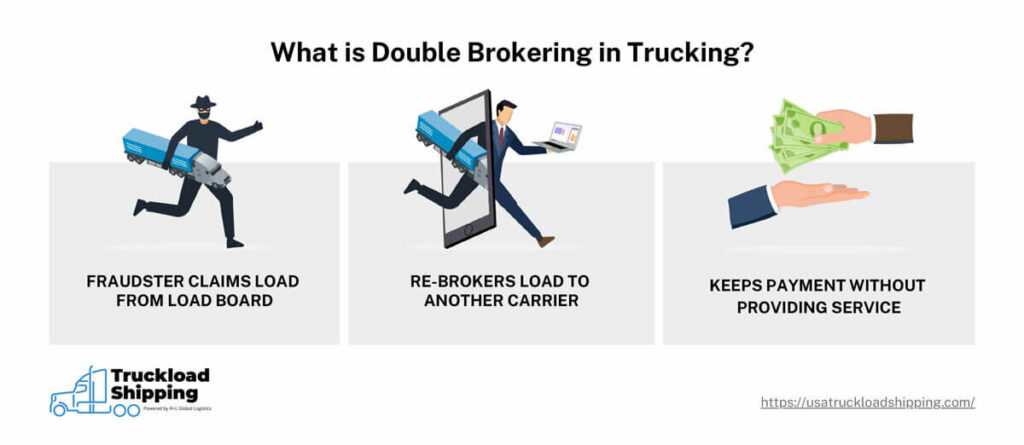Brokers play an important role in logistics, connecting shippers and carriers across the country. However, the practice of double brokering strains relationships between customers and service providers in the shipping industry, and leads to a loss of time and money for all victims involved.
Key Takeaways
This comprehensive guide will lay out the definition of double brokering, how it affects the logistics industry, and ways to prevent & report freight fraud.
Double brokering is a practice within the freight industry where a broker or carrier, who has secured a load from a shipper, subcontracts that same load to another broker and/or carrier without the explicit knowledge or consent of the shipper. It basically introduces an additional intermediary into the freight shipping process without the customer’s knowledge.
The key players in double brokering transactions include:

Keep in mind that the unauthorized broker or carrier is often a victim themselves. In cases of freight fraud, the double broker is usually the first broker or carrier in the chain of communication. They then illegally subcontract the load to an unsuspecting third party. It is this first link in the chain who profits illicitly from the transaction, either by being paid despite rendering no services or through theft of the shipment itself.
Double brokering in trucking is a deceptive and often fraudulent practice. The shipper expects to know exactly who they’re working with for any given shipment. When a new party is involved without the shipper's knowledge, it can lead to a host of issues.
The effects of double brokering can be broadly separated into two categories:
These impacts are only felt harder with each passing year as incidences of double brokering continue to rise. In fact, load board provider TruckStop recorded a 400% increase in double brokering from the final quarter of 2022 to the first quarter of 2023 alone.
Let’s begin detailing the ways this form of freight fraud hurts shippers and the industry as a whole.
Double brokering has significant economic ramifications for all parties involved in the fraudulent transaction.
On top of these issues, more entities in the process increases the risk of delays and increased cargo damage. As shipments pass through multiple brokers and/or carriers, the lack of direct communication between all parties involved can lead to confusion regarding delivery timelines and other critical details.
It also leads to a lack of accountability, making it difficult to identify the party responsible and properly handle situations when things go wrong. This lack of coordination can negatively impact the overall efficiency of the supply chain and lead to serious liability concerns when a shipment is delayed or cargo is lost or damaged.
Unfortunately, this practice is currently on the rise, which means the likelihood that shippers will encounter issues resulting from fraudulent freight movement will increase.
TriumphPay, a carrier payments platform, has also stated they’ve encountered numerous incidents of this fraudulent activity. In fact, they’ve claimed that between $500 to $700 million worth of freight per year falls victim to this practice.
Given its fraudulent nature, some cases of double brokering have led to criminal charges. Misrepresenting information or engaging in deceptive practices can result in fines or incarceration for the offending party.
Related: Is Double Brokering Freight Illegal?.
While both of these practices involve two or more brokers, the key difference lies in transparency between the parties involved. In summary:
To further illustrate how double brokering works, let’s look at some examples of the practice in action.
There are multiple ways double brokering may occur, but the following scenarios are among the most common.
Example 1: A shipper contracts with Broker A to transport a high-value shipment. Broker A subcontracts the shipment to Broker B due to capacity constraints without the shipper’s knowledge. This creates a complex network of intermediaries and increases the risk of miscommunication.
Example 2: Broker X, a deliberate fraud practitioner, secures a time-sensitive shipment from a shipper. However, they subcontract the same load to Broker Y promising a high rate from the shipper but insisting on receiving their brokerage fee up front. Broker Y executes the freight tender, but never hears back from the fraudulent broker and receives no payment.
As you can see from the first example, double brokering isn’t always a malicious act - sometimes it results from constraints on the first broker. However, regardless of intent, it can cause communication issues, errors, and legal issues.
Meanwhile, the second example, is outright freight fraud, and highlights one of the main issues that people have with double brokered loads.
Earlier, we mentioned these cases end up causing financial losses, disputes over payment, delayed shipments, and overall disruptions to the supply chain. Thankfully, there are ways to recognize and prevent double brokering from affecting your business.
To avoid the pitfalls of double brokering, consider these preventive measures:
Reporting incidences of double brokering is also an effective way of ensuring that those who are caught in the act can’t easily do so again. By reporting fraudulent freight practices to the FMCSA, you protect the whole business from the damage double brokering can do.
Double brokering poses significant challenges to the freight industry, but you can mitigate the issue by partnering with trustworthy providers.
At USA Truckload Shipping, we take the time necessary to vet all our business partners, preventing fraudsters from ruining your shipping experience.
Our logistics services also include:
Ready to secure your freight operations? Call us at (866) 353-7178 or submit a request for proposal today!
R+L Global Logistics
315 NE 14th St., Ocala, FL 34470